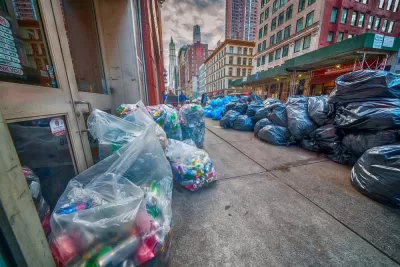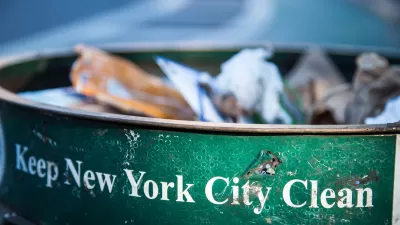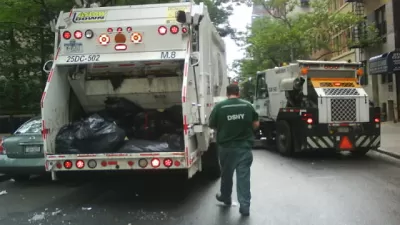The city’s sanitation department says the program, while successful on one block, would be too difficult and expensive to implement citywide.

A pilot program for ‘containerization’ of New York City’s garbage can’t be applied citywide, according to Department of Sanitation Commissioner Jessica Tisch. Kevin Duggan reports on the story for Streetsblog NYC, quoting Tisch as saying, “This is an incredibly resource-intensive pilot, and this approach is not scalable beyond its current scope.”
The department is evaluating possible avenues for containerization, the practice of streamlining trash collection by putting all trash in containers that can be picked up by automated cranes on trucks. “Tisch called the effort ‘one of the most complicated infrastructure projects’ for the city in the coming decade.”
While the pilot was successful in getting trash bags off the sidewalk, bags still ended up outside the containers, making it difficult to speed up the process since workers still have to exit trucks to load the bags. A successful container program requires frequent pickup, often once or even twice a day as opposed to the city’s current schedule of every two to three days. Meanwhile, the need to use curbside space previously reserved for parking is expected to receive pushback from some resident groups.
Residents and landlords in the pilot block, however, say the program vastly improved sanitation conditions. “On W. 45th Street, Streetsblog found about a month into the pilot that the bins kept the sidewalk blissfully clear of the usual mounds of black garbage sacks New Yorkers have to weave around on the eves of collection days.”
FULL STORY: Clean Curbs Pilot ‘Not Scalable’ Citywide, Says DSNY Commish

Maui's Vacation Rental Debate Turns Ugly
Verbal attacks, misinformation campaigns and fistfights plague a high-stakes debate to convert thousands of vacation rentals into long-term housing.

Planetizen Federal Action Tracker
A weekly monitor of how Trump’s orders and actions are impacting planners and planning in America.

San Francisco Suspends Traffic Calming Amidst Record Deaths
Citing “a challenging fiscal landscape,” the city will cease the program on the heels of 42 traffic deaths, including 24 pedestrians.

Adaptive Reuse Will Create Housing in a Suburban Texas Strip Mall
A developer is reimagining a strip mall property as a mixed-use complex with housing and retail.

Study: Anti-Homelessness Laws Don’t Work
Research shows that punitive measures that criminalized unhoused people don’t help reduce homelessness.

In U.S., Urban Gondolas Face Uphill Battle
Cities in Latin America and Europe have embraced aerial transitways — AKA gondolas — as sustainable, convenient urban transport, especially in tricky geographies. American cities have yet to catch up.
Urban Design for Planners 1: Software Tools
This six-course series explores essential urban design concepts using open source software and equips planners with the tools they need to participate fully in the urban design process.
Planning for Universal Design
Learn the tools for implementing Universal Design in planning regulations.
Heyer Gruel & Associates PA
JM Goldson LLC
Custer County Colorado
City of Camden Redevelopment Agency
City of Astoria
Transportation Research & Education Center (TREC) at Portland State University
Jefferson Parish Government
Camden Redevelopment Agency
City of Claremont





























